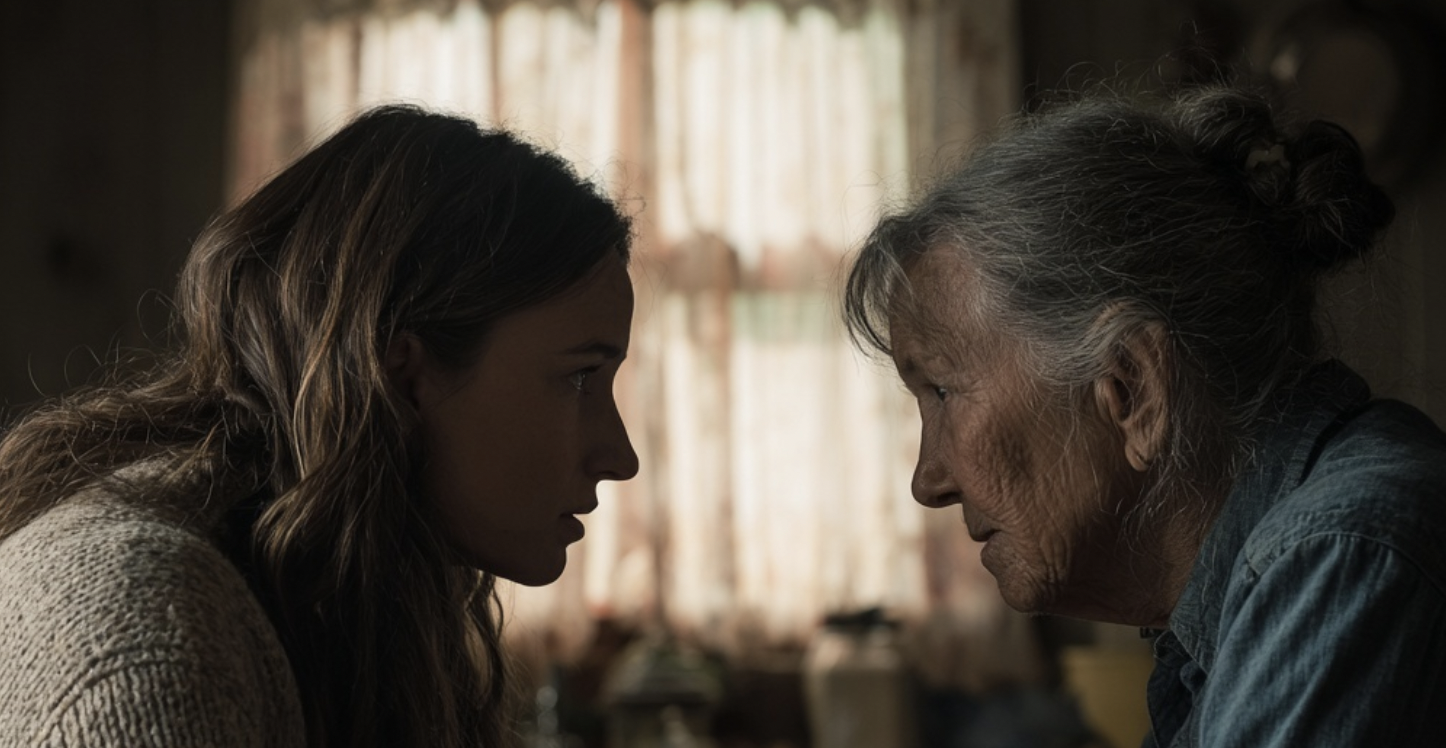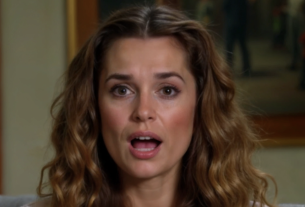“Katya, come here, quick! Look at this machine! This isn’t a motorcycle, it’s a dream!”
Denis’s voice, full of boyish, genuine excitement, burst into the kitchen, cutting through the steady hum of the extractor fan and the soft clink of dishes. Without turning, Katya finished rinsing a plate and set it in the rack. She dried her hands on a waffle-textured towel and only then slowly turned. Her husband stood in the doorway, holding out a tablet whose screen glowed with the promise of freedom and adventure. The photo showed a motorcycle—black, massive, with a predatory curve to the fuel tank and so much chrome that even in the dull picture it looked blinding. It wasn’t just transport; it was an image, a manifesto.
“Beautiful,” she agreed evenly, stepping closer. She didn’t take the tablet, just let her gaze slide over the image and then down to the specs beneath it. Year, mileage, price. The last number made her press her lips together, just a fraction.
“Beautiful? Katya, it’s not beautiful, it’s magnificent! It’s a real beast! Can you imagine us riding it out of the city in summer? Wind in our faces, the open road… It’s a completely different feeling! A real man’s dream!”
He spoke quickly, tripping over his words, his eyes shining the way they hadn’t in a very long time. Katya looked at him—this thirty-two-year-old man with the burning eyes of a teenager—and felt something cold and heavy rise inside her, like fatigue.
“Denis, you don’t have a Category A license,” she said quietly but distinctly. Each word was a small stone tossed into the torrent of his enthusiasm.
“I’ll get one! That’s no problem at all—courses are on every corner these days. A couple of months and I’m set!”
“You’ve never in your life sat behind the handlebars of a motorcycle. Not even a moped.”
“Everybody starts sometime!” He waved a hand, brushing her argument away like a pesky fly. “I’ll learn! The main thing is to feel the balance. I’m great on a bicycle!”
Katya sighed. She went to the kitchen cabinets and straightened the spice jars, lining them up in a perfect row. It was unconscious, an attempt to bring order to something in the oncoming chaos.
“And one last thing, Den. The price. Did you see the price?” She turned and looked him straight in the eye. “Where are we going to get that money?”
The spark in his eyes dimmed for a second, then flared again, this time with a shade of stubbornness. He knew this was the weakest point of his plan and braced for the fight.
“Where from… We have it. In the box.”
The tin cookie tin on the top shelf of the bedroom wardrobe. In it, crumpled bills of different denominations held their shared, hard-won goal. Money for the renovation of that very bedroom, where the shabby wallpaper bubbled near the ceiling and the old parquet creaked under every step like an ungreased cart. They had saved for almost a year, denying themselves little things, rejoicing at every new note they managed to tuck away.
“Denis, that money is for the renovation,” Katya said as if explaining something obvious to a child. “We agreed. We both wanted it. A new bed, a wardrobe, new flooring… Did you forget?”
“The renovation can wait!” His voice rose, wounded notes ringing in it. “Wallpaper can be redone later; that’s nothing! But this will get sold! A specimen like this will be gone in a couple of days, I’m sure! You just don’t get it—this is a chance!”
“I understand something else.” Katya took a step toward him; her voice stayed calm, but steel crept into it. “I understand that we set a goal together and worked toward it together. And now you want to take our shared money and spend it on your personal toy. A dangerous and absolutely impractical toy.”
The excitement on his face finally collapsed into a sulky, almost childish look. He deflated like a punctured ball. The tablet in his hands, the symbol of a dream, turned back into a piece of plastic and glass.
“I knew it. You only care about rules and plans. Step left, step right—no way. You just don’t want me to have any joy. You’re killing everything alive in me.”
He didn’t argue further. He turned on his heel and went to the bedroom, deliberately. Katya stayed alone in the kitchen. She heard the soft but offended click of the lock. A minute later came his muffled muttering. He wasn’t shouting; he was complaining. And Katya knew without a doubt exactly whom those complaints were meant for. She glanced at the wall clock. The countdown had begun. The motherly cavalry was already saddling up.
She didn’t even make it to a hundred. Forty-seven minutes. That was exactly how long it took Irina Pavlovna to receive the distress signal, call a taxi, and arrive at the battlefield. The doorbell wasn’t simply insistent—it was short and furious, like a whip crack. It carried no question of “may I come in,” only the order “open at once.”
Katya opened the door. Her mother-in-law stood on the threshold. Lips pursed, heavy gold earrings in her ears, and a weighty, appraising stare that seemed capable of burning through the door and through Katya herself. She was dressed as if she were heading not to save her son from a domestic squall but to a party committee meeting—strict suit, impeccable hairstyle. Behind her broad back, like behind a stone wall, loomed Denis. His face wore a look of offended innocence, mixed with the poorly concealed anticipation of righteous retribution. He looked at Katya over his mother’s shoulder with a gaze that said, “Well? Had your fun? Now we’ll talk differently.”
“Hello, Katya,” said Irina Pavlovna in the tone with which audits begin.
Without waiting for an invitation, she stepped inside. Dirt from her street shoes immediately printed itself onto the light laminate in the entryway, but she acted as though she hadn’t noticed. Passing Katya, she headed straight for the kitchen, as if she knew exactly where the epicenter of the conflict was. Denis slipped in behind her, trying not to meet his wife’s eyes.
Irina Pavlovna stopped in the middle of the kitchen and surveyed it with a proprietorial glance. Her eyes lingered on the cabinets, the spotless counters, and finally fixed on the top shelf of a cupboard, where the corner of that same cookie tin was visible.
“That’s how you kill everything manly in a man,” she began, speaking as if to the room at large, though each word was a poisoned arrow shot straight at its target. “First you make him stop dreaming, then you forbid him to want anything, and then you’re surprised he lies on the couch staring at the ceiling. The man gets a dream, a spark in his eyes! And you douse it with cold water on the spot.”
Silently, Katya went to the sink and picked up a clean cloth. She began wiping an already dry, gleaming countertop. Her movements were slow and precise. She had no intention of getting into this squabble. Not yet.
“That’s exactly what I told her, Mom,” Denis piped up from behind his mother. “I said it’s not just a hunk of metal, it’s a state of mind! It’s freedom! And she’s going on about wallpaper…”
“Wallpaper!” echoed Irina Pavlovna, turning to Katya and addressing her directly for the first time, though with a scornful intonation. “Of course wallpaper is more important. Stripe to stripe, flower to flower. The main thing is that everything is proper, like in a ledger book. And the fact that your husband’s soul is out of place, that he’s suffocating in this rut—that’s all trifles. Disposable.”
She paused, letting her words soak into the kitchen air. Denis nodded along, his face expressing the cosmic sorrow of a misunderstood genius. Katya kept methodically running the cloth over the same spot. This silent, pointed calm infuriated Irina Pavlovna even more than if her daughter-in-law had started shouting and defending herself.
“You should be wiser, Katya. You’re a woman. Your job is to create coziness not just with walls but with atmosphere. To support him, inspire him! And what do you do? You nag. You turn him into your captive. Every penny—only with your permission. Every desire—under your control. That’s not how a family is built. That’s how a prison is built.”
She came closer and stood directly in front of Katya. Katya finally lifted her head, and their eyes met. Irina Pavlovna’s held righteous indignation and absolute certainty of her own rightness. Katya’s held nothing but a cold, clear emptiness.
“You must understand that his happiness is your happiness too!” the mother-in-law delivered her signature line, the trump card that, in her opinion, should crush any resistance. “If Denis is happy on his motorcycle, it will only be better for you!”
The phrase—meant to be the smashing final chord of her lecture—hung in the kitchen air. It had been honed by years of practice, saturated with reinforced-concrete maternal rightness, and aimed straight at the heart of guilt. Mother and son froze, waiting for the effect: now the daughter-in-law should wilt, lower her shoulders, maybe even sob and admit defeat. They awaited capitulation.
Instead, Katya laughed.
It wasn’t a hysterical cackle or a poisonous giggle. It was a loud, utterly sincere laugh rising from somewhere deep in her belly. A deep, liberating laugh of someone who has wandered in fog for a long time and suddenly sees a clear, absurdly simple way out. She threw her head back, and the sound—devoid of any mirth—filled the kitchen, ricocheting off the tile and glossy cabinet fronts. It was so out of place and unexpected that Irina Pavlovna and Denis stared at her as if she’d suddenly gone mad.
“She… what?” Denis muttered, bewildered, looking at his mother.
Irina Pavlovna pressed her lips even tighter; color crept into her face. That laugh was an insult, a slap more humiliating than any shouted retort. It devalued everything: her trip, her words, her righteous anger.
Katya stopped laughing as suddenly as she had started. She straightened, lowered her hands, and looked at them. But the look was different now. If a minute earlier her eyes had held cold emptiness, now a steady, calm flame burned there—the flame of a decision made. Her face had settled into a detached, almost businesslike expression.
Without a word, she turned and left the kitchen. Her steps in the hallway were even and firm. Mother and son exchanged glances. Bewilderment slid into unease. What was she up to?
A moment later she returned. In her hands was that very cookie tin. The symbol of their quarrel, of their shared hopes, and now—of their broken union. She approached the dining table, where no one had sat, and set the tin in the middle with a dry thud. Denis tensed; Irina Pavlovna instinctively stepped back.
Katya hooked a fingernail under the tightly fitting lid. With a loud metallic groan that sounded like a scream in the silence, the lid gave way. Katya tipped the box over. A waterfall of crumpled bills and a bright clatter of coins cascaded onto the lacquered tabletop. The money they had saved so long and carefully now lay in a sorry, jumbled heap, mixed with dust and little slips of paper where they had once scribbled their plans.
Irina Pavlovna and Denis stared, speechless. They had expected anything—an argument, shouting, ultimatums—but not this cold, methodical performance.
Ignoring them, Katya went to work. She worked like a bank teller at the end of a hard day. The fingers that had just been squeezing a dishcloth now moved with chilly precision. She smoothed every crumpled bill and stacked them by denomination: thousands with thousands, five-hundreds with five-hundreds. Then she moved on to the coins, raking them together and arranging them in chiming little towers, ten to a stack. The process was meditative and terrifying in its ordinariness. She didn’t rush. She was counting their shared past, turning it into two equal parts.
When she finished, she surveyed the result. Two absolutely identical piles of money. Two neat stacks of notes and two rows of coin towers. She took one half, slid it carefully to the edge of the table, and, lifting her eyes, looked not at her husband but straight into Irina Pavlovna’s face. She held the money out to her.
Katya’s hand, extended with the cash, hung in the air. It didn’t tremble. It wasn’t the gesture of a supplicant or a giver; it was the gesture of someone closing a deal. Irina Pavlovna looked at the offered wad, then at her daughter-in-law’s impassive face, and her own, which had been merely stern until then, began to twist with rising rage. Shock gave way to comprehension. This wasn’t a peace offering. It was a declaration of war, one she had already lost without even understanding the rules.
“Then take your little boy by the hand and go live with him at your place! Because I don’t need another child here who runs to his mommy to tattle all the time, and then she comes storming in to make a scene!”
Katya’s voice was even and emotionless. She didn’t shout. She stated a fact, pronouncing each word as clearly and evenly as if reading a verdict. “Little boy.” “By the hand.” “Child.” “Mommy.” All the cutesy diminutives Irina Pavlovna loved to use for her Denis, in Katya’s mouth, sounded like a brand.
Denis was the first to snap out of it. His face shifted from offended-smug to crimson.
“What… what are you even saying? Katya, are you out of your mind? Mom came to help us, to sort things out!”
“I’ve already sorted things out, Denis. Thanks for the help,” Katya didn’t even look at him, keeping her eyes on her mother-in-law while holding out his inheritance from their shared life.
With a short, furious exhale, Irina Pavlovna snatched the money from her hand. The bills crumpled in her fist.
“Oh you… How dare you talk to him like that? To me? I’ve given my life to him so some little flibbertigibbet like you could then point him to the door? Out of his own home!”
She stepped forward, looming over Katya. Her heavy earrings swayed in time with her angry breathing. But Katya didn’t retreat an inch. She simply stood and watched as if observing a volcanic eruption from a safe distance.
“He’s the one who complained that you stomp on his dream!” the mother-in-law shouted, jabbing a finger at Katya. “That you’re turning him into a henpecked husband! He was telling the truth! Look at you now! Cold, calculating! Everything sorted into neat little piles! You’ve sorted our whole life that way, too!”
The kitchen grew noisy. Their voices—Denis’s and Irina Pavlovna’s—blended into a single accusatory drone. They hurled reproaches at her in turn: her selfishness, her disrespect for elders, that she had never truly loved Denis and only used him. They spoke loudly and viciously, trying to pierce her calm, to make her snap so they could level the field and seize the initiative again.
But Katya no longer heard them. She looked at their faces twisted with anger, at Irina Pavlovna’s clenched fist with her son’s “manly dream” crumpled inside, and felt nothing but final, crystalline liberation. As if she had worn heavy, ill-fitting boots for years and had finally managed to kick them off.
Unhurriedly, she reached for the second half of the money lying on the table—her half. She neatly gathered the stacks of bills, scooped the coin towers into her palm. The metal was cold. She didn’t recount it; she simply held it, feeling its weight.
Then, cutting through their ragged shouting with her calm, firm, and therefore even more deafening voice, she spoke her last words:
“And I’ll spend this half on the renovation. In my bedroom. Alone.”
She turned and walked out of the kitchen, slowly, carrying in her hand everything that was left of their shared future. She didn’t look back. She didn’t slam the door. She just went into the room and pulled it gently shut behind her.
They stayed where they were, in the middle of the kitchen—two enraged, bewildered people. Irina Pavlovna glared at the closed door, her fist still crushing the wrinkled bills. Denis stood beside her, his face a mix of anger and confusion. The quarrel was over. The money for the dream was in their hands—but the dream itself had turned to dust, because the home it lived in had just ceased to exist…



